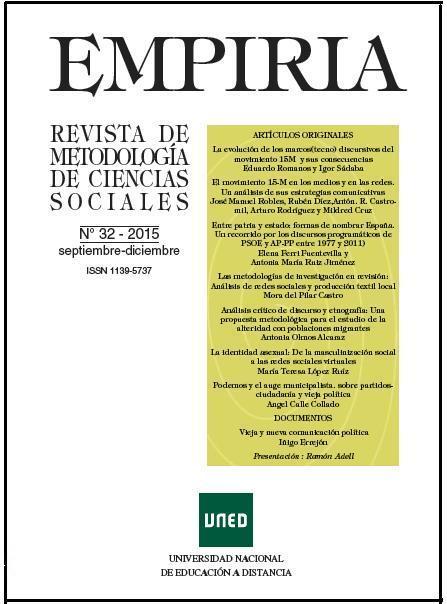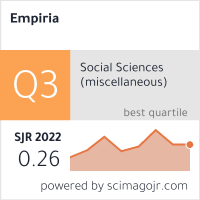The evolution of (techno) discoursive frames of 15M movement and its consequences
DOI:
https://doi.org/10.5944/empiria.32.2015.15307Keywords:
new political parties, technopolitics, protest cycles, social media, 15 MAbstract
The Spanish 15M movement (also known as the Indignados) was very critical of political parties and the current system of political representation. However, the protest cycle has evolved into a growing and complex process of institutionalization in which activist have been participating in the creation and development of a number of new parties (Partido X, Ganemos and Podemos). This paper analyzes the role played by new technologies in this process. The basic hypothesis is that the extensive use of digital tools, which encourage participation and deliberation in the creation and development of these new parties, in some ways reproduces essential values and practices of the movement, thus facilitating the identification between the 15M activists and the parties. In this way, the transition between movement and party has been conditioned by, among other things, a component of technological mediation, generating an environment of horizontal deliberation, participation distributed and decentralized structure. The use of these tools has been accompanied by the development of a certain technophile frame that stresses the potential of new technologies for social and political change. Thus, the classical notions of representation or participation are redrawn allowing a smooth evolution from the squares to the Parliaments. This article examines the construction of technophiles frameworks, which influenced by the presence of free software and open source, help us to understand the organization of the new movement-parties and the transition between the different forms of collective action. Likewise, some of these digital tools are mentioned and outlined and the role that they have played in order to forge new organization models for these movement–parties are described.
Downloads
Downloads
Published
How to Cite
Issue
Section
License
Los autores que publican en esta revista están de acuerdo con los siguientes términos:a) Los autores conservan los derechos de autor y garantizan a la revista el derecho de ser la primera publicación del trabajo al igual que licenciado bajo una Licencia Internacional Creative Commons CC BY-NC-SA 4.0.
b) Se permite y se anima a los autores a difundir electrónicamente las versiones pre-print (versión antes de ser evaluada) y/o post-print (versión evaluada y aceptada para su publicación) de sus obras antes de su publicación, ya que favorece su circulación y difusión más temprana y con ello un posible aumento en su citación y alcance entre la comunidad académica.










